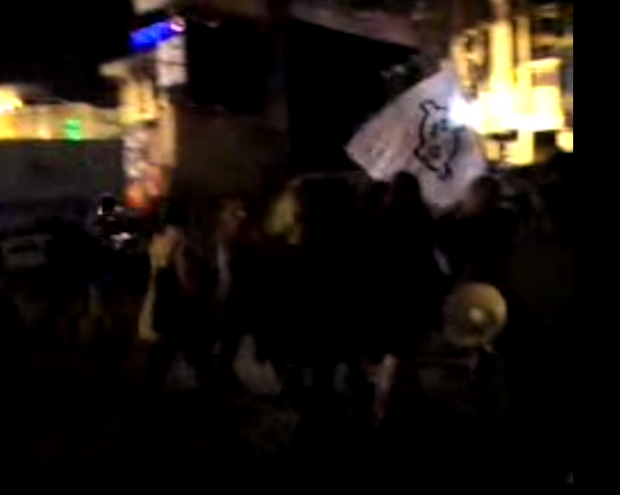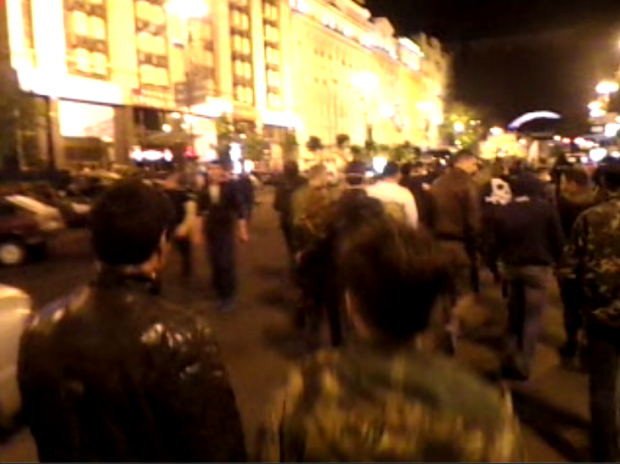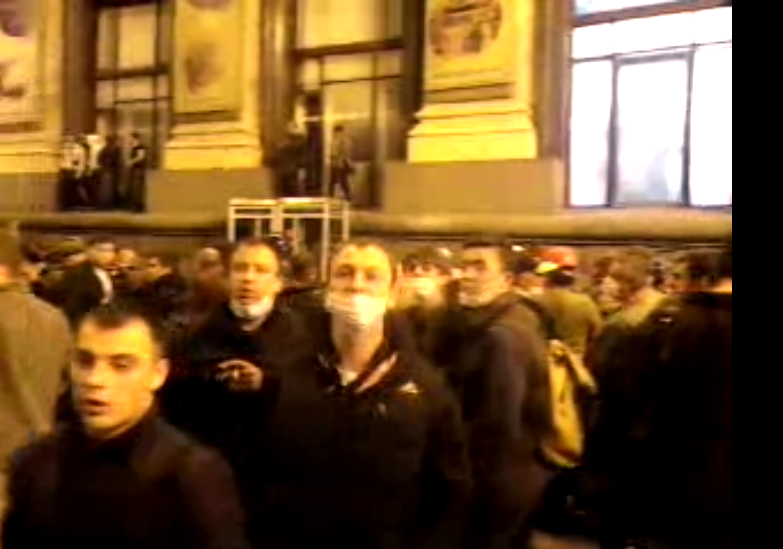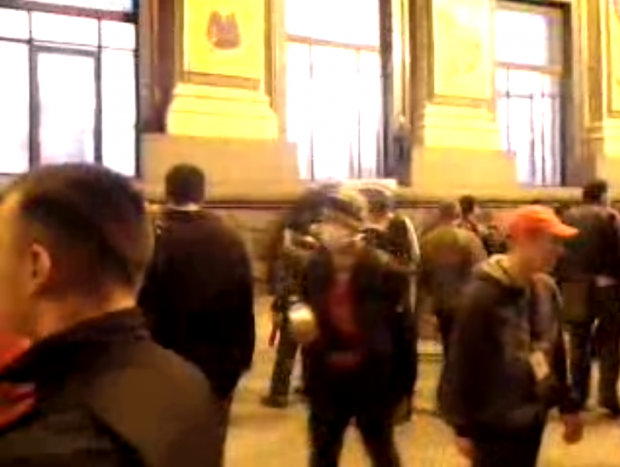After yesterday’s violence in Donetsk and the shooting of Kharkiv Mayor Gennady Kernes, the situation is extremely volatile in south-east Ukraine today. The European Union and Canada have followed the United States in announcing new waves of sanctions against Russian and Ukrainian officials involved in both the annexation of Crimea and the destabilisation of south-east Ukraine.
Yesterday’s liveblog can be found here. For an overview and analysis of this developing story see our latest podcast.
Please help The Interpreter to continue providing this valuable information service by making a donation towards our costs.
An interactive map of the situation:
View Ukraine: April, 2014 in a larger map
For links to individual updates click on the timestamps.
Here is a live stream from the Regional State Administration in Luhansk, which is being stormed by separatists:
Live streaming video by Ustream
Below we will be making regular updates. Be sure to check back often and hit refresh.
From what we noticed from the livestream, many in the right-wing crowd did speak Russian, though there were also members of that group who were chanting Ukrainian slogans like “Geroyam Slava.” At one point, the people in the procession shouted, “to whom does Luhansk, Donetsk, Kharkiv.. belong?” The crowd then shouted “to Ukrainians!”
Frankly, there are many unanswered questions, Many nationalist groups are not strangers to Maidan Square, but this group appeared to be, and they were very hesitant to reveal their faces.
Pravda.com.ua has posted their report about what has transpired in Maidan Square (translated by The Interpreter):
A mass fight broke out at one of the Maidan barricades between people in balaclavas who had organized a “torchlight procession” and self-defense members.
As Hromadske TV reports, about 20 minutes ago, activists gathered at the Kiev council building and moved toward Maidan with a torch procession.
The column was stopped by Maidan self-defense members at the barricade across from the Main Post Office. A fight broke out.
According to Hromadske TV, the activists with the torches planned to go near the Verkhovna Rada, in order to demand from the government start a full-fledged anti-terrorism operation in the east.
Meanwhile, Interfax-Ukraine reports that the torch procession was devoted to heroes of the “Heavenly Hundred.” During the clash, flash grenades and firecrackers were used.
According to Hromadske, several persons have been injured.
The Pravda report does not mention that the crowd carrying the torches were ultranationalists who appeared to be carrying symbols associated with neo-Nazism.
We are still working to find more details and answer more questions about what transpired in Maidan tonight.
U.S. Secretary of State John Kerry said today that NATO is at a “defining moment,” as NATO countries are now under threat. Reuters reports:
“Today Russia seeks to change the security landscape of Eastern and Central Europe,” Kerry said in a speech in Washington referring to Russia’s occupation of Crimea and the threat it posed to eastern Ukraine.
“Whatever path Russia chooses, the United States and our allies will stand together in our defense of Ukraine,” Kerry said.
“And most important, together we have to make it absolutely clear to the Kremlin that NATO territory is inviolable. We will defend every single piece of it,” he added.
Kerry added that defense budgets cannot be cut if NATO wants to send this message.
As we reported earlier, Russia’s rhetoric has continued to escalate, going as far as to accuse the interim government in Kiev of building concentration camps for ethnic Russians.
The Ukrainian Foreign Ministry has now denied Moscow’s claim (partial translation by The Interpreter):
“‘The Ministry of Foreign Affairs and the State Migration Service consider it expedient to officially clarify that in September 2009, Ukraine began implementing together with the European Union the READMIT 1 project, which provided for the construction of two places of temporary stay for illegal migrants — in Donetsk and Nikokolayev Regions. Both facilities will be intended for one-time detention of 100 illegal migrants each,’ says the statement.
Today, there are two facilities under the management of the State Migration Service of Ukraine, in which illegal migrants are held – in Volyn and Chernigov Regions. These facilities are intended for the one-time detention of 165 and 208 persons, respectively, and are territorially located close to the western and northern sections of the state border of Ukraine.
Construction of similar facilities in Donetsk and Nikolayev Regions enables cost-savings for transporting illegal migrants held in the eastern and southern regions of Ukraine in places of detention.
“It should be noted that in the temporary detention facility for illegal migrants, only foreigners or stateless persons can be placed who have violated migration law and regarding whom a decision has been made about the forced deportation from Ukraine,’ the statement emphasizes.”
This statement contrasts greatly with Moscow’s claim that new construction projects were designed to house thousands of illegal immigrants, or perhaps even ethnic Russians from eastern Ukraine.
In fact, we just took these screen captures from the livestream that appear to show a crowd, following a white flag with a Nazi symbol on it, away from the square, as both the neo-Nazis and the Maidan rally shout counter slogans:


There is always the possibility that these neo-Nazis are “provocateurs,” people staging a rally in order to provoke violence or advance a particular narrative.
It’s hard hard to make out what’s going on from the livestream, except that the situation is currently fairly calm, though there are many people there with weapons, riot shields, and camouflage. Some of them may be Maidan’s own self-defence forces, or others may be the provocateurs that tried to storm the square.
Some screenshots:


Some good news for the Russian economy, though the news is not even as positive as these modest gains indicate. Reuters reports:
Russian asset prices rose on Tuesday, reflecting investors’ relief that new Western sanctions against Russia over Ukraine were less severe than many had feared, but shares gave up some gains after further civil unrest in eastern Ukraine.
At the close the rouble-denominated MICEX share index was up 0.4 percent to 1,305 points, while the dollar-denominated RTS had risen 1.2 percent to 1,153 points.
On Monday, when the new sanctions were announced, the MICEX rose 1.6 percent and the RTS 2.2 percent, having fallen 5.6 percent and 6.7 percent respectively the previous week.
New sanctions did not directly target any major Russian company or industry. But experts also warn that because the Russian economy had already taken so many hits, most of this trading is just “short money” rather than long-term investment. In other words, the economy has been sliding for so long that investors are seeing an opportunity to buy now and sell soon.
Still, if the message Russia was supposed to learn from these sanctions is that their economy will be severely hurt if they continue to dig at Ukraine, it’s hard to say whether Russia will receive that message after their (minor) stock market rally.
The Telegraph reports:
The poll of citizens of 10 EU nations found 55 per cent agreed that their country should “do everything possible to support the remaining country of Ukraine and its people to achieve political and economic stability”.
However, when specific actions that could be taken by the leadership of their own country to deal with the situation were tested, support was relatively weaker, especially for military action.
The whole breakdown of the poll can be found here.
As you can see, some in the crowd have riot shields that look like they belong to Ukrainian riot police. The well-equipped soldiers, who are now ubiquitous across eastern Ukraine, are clearly running the show, with local recruits and civilians taking orders from them.
Earlier today the regional administration building in Lugansk was also captured by Russian-backed militants. The now-familiar barricades were quickly erected around that building, just as we’ve seen elsewhere.
NB News, a Ukrainian news site, reports that a lawyer has been attacked by separatists in Lugansk for refusing to make a televised address for them.
NB News reports:
On Tuesday, April 29, in Lugansk, the president of the legal company Chudovsky and Partners, Igor Chudovsky, received a gunshot wound and was hospitalised in a critical condition. This was announced by his wife, Irina Chudovskaya.
According to Mrs Chudovskaya, they wanted her husband to speak on regional television, but he refused. He tried to resist, and as a result, received two wounds in his chest from the separatists.
He has lost a lot of blood and is now in critical condition in the regional hospital.
Note that Igor Chudovsky also leads the Anti-Corruption Committee, set up at the National Resistance Headquarters in Lugansk.
Russian-backed separatists in Lugansk are now attacking the regional police headquarters. The leaders of the attack are heavily armed and camouflaged.
A live video stream from Lugansk is embedded above this feed. A Russian flag is being raised over the entrance as the crowd chants “Russia”.
Ukrainska Pravda‘s economic section reports that the owners of a factory in the town of Stakhanov, in the Lugansk region, have forbidden their workers to vote in the May 25 presidential elections:
At a general staff metting the management of the Stakhanov Railway Car Building Works (a joint stock company) have announced at a ban on voting in the Ukrainian presidential elections.
Ekonomicheskaya Pravda was told of this by an employee at the factory.
According to him, workers were warned that, if they voted, they would be fired from their jobs. He also said that such meetings have been held at other companies in Stakhanov.
“The initiators of the voting ban are allegedly colluding with regional leaders” said the source.
Ukrainska Pravda notes that the factory’s exports are dominated by former Soviet states, most of which, bar the Baltic states, are likely to be influenced by Russia’s position. At the moment, the plant is only open two days a week due to a lack of orders. Stakhanov Railway Car Building Works is, according to Forbes Ukraine, owned by the billionaire Konstantin Zhevago. The paper notes that Zhevago is the main beneficiary of Ferrexpo, a leading iron ore company.
The entire article on the Atlantic Council website is a must-read. They post a video of a local Ukrainian journalist who dons a camouflage jacket and a fake AK-47, asks directions to the town hall in Russian, and seems to be able to completely waltz around the provincial capital of Cherkasy without either townspeople nor police stopping him. Here is a brief excerpt:
At a roadside grocery they stop and Chernyavsky hops out, rifle in hand, to ask directions of a man standing nearby. “Excuse me, how do I get to the regional administration building?” he asks in Russian (1:46). The man helpfully explains: a turn just here, and then go straight all the way to the center. “You’ll see a three story building on your left and you’re there,” he says.
“Can I storm the building?” asks Chernyavsky. The man shrugs: “As you like.” Chernyavsky bounds toward the car, calling back to the man, “Russia is with you!”
They drive, Chernyavsky’s gun barrel visible through the car window. Another stop for directions, this time from a woman pedestrian (2:50). “Just drive straight on to the center, it’s right there,” she says. “Are our guys there, those who want to separate from Ukraine?” asks Chernyavsky, always in Russian. For her, this is too much. She turns away, calling out, “No, we don’t want to separate!”
“Then why are you telling me where the provincial headquarters is?” Chernyavsky shouts after her.
And the video:
The statement is below:
The United States is disgusted by last night’s savage attack on the peaceful pro-unity demonstrators in Donetsk, including many women and children. This senseless violence is a reminder of the struggle for dignity that underlies the political debate in Ukraine today. We also condemn the separatists’ taking of hostages, both Ukrainians and international monitors, some of whom have been brutally beaten. There is no place for these examples of inhuman behavior in a modern, democratic society. This is terrorism, pure and simple. We support the Ukrainian Government’s efforts to contain this threat and defend the lives and safety of its citizens. In addition, we call on all who hold sway with these armed groups, including the Russian Federation, to arrange for an immediate cessation of all violent acts and the release of all hostages. This is a reminder of why the elections on May 25 will be so important to the future of this country. And in that the Ukrainian people will enjoy the full support of the United States.
Ukraine’s interim Prosecutor General, Oleg Makhnitsky, has told the Financial Times in an interview that ousted President Viktro Yanukovych absconded with $32 billion in cash when he fled to Russia. Kyiv Post reports:
He believes Yanukovych is using this money to finance the pro-Russian separatist movement in the eastern regions of Ukraine. Russia continues to harbor the ex-president who authorities have implicated in murder and grand corruption. Makhnitsky added that Russia refuses to cooperate with Ukraine to extradite the wanted former head of state who fled overnight on February 21-22…
Interestingly, Ukraine’s state budget for 2014 is only $31.5 billion, according to the April 29 hryvnia rate on the interbank exchange market. The country urgently needs financial assistance to cover the $24.4 billion fiscal gap, Prime Minister ArseniyYatsenyuk earlier stated. Recovering the money with which Yanukovych and his inner circle allegedly absconded to Russia may contribute greatly to solving this problem.
$32 billion, in cash, is a truly massive sum. It’s not clear how strong the evidence is that would support this claim, but if true it would indicate a large-scale operation, likely by many high-level Ukrainian authorities.
How is Russia reacting to the latest developments, and what does that indicate as far as the Kremlin’s strategy? The easiest way to answer these questions is to listen to the Ministry of Foreign Affairs — especially since they always summarize their thinking in both the Russian press and with their twitter account. Let’s take this quote from ITAR-TASS (a Russian state-operated news agency):
“If someone in Brussels hopes to stabilize the situation in Ukraine this way, this is an obvious evidence of full misinterpretation of domestic political situation in that country and direct invitation to local neo-Nazis to continue their outrage and lynch civilians in south-eastern Ukraine,” the ministry said.
A new portion of sanctions against Russian and Ukrainian citizens announced by the European Union cannot but cause repulsion, the Russian Foreign Ministry said Tuesday.
“A new installment of sanctions imposed by the EU on Russian and Ukrainian citizens cannot but cause repulsion,” the ministry’s commentary said. “Instead of making the Kiev clique take seats at a conference table together with the southeastern regions and discuss the future structure of the country, our partners have taken lead from Washington and are making ever more unfriendly gestures towards Russia,” the foreign ministry added.
Again, Russia is making the case that the interim government in Kiev is both illegitimate and dangerous, and the Western governments are making things worse. If Russia decides to take unilateral action, this is the justification that they will use.
And for the record, there is no evidence of anyone in Ukraine being “lynched” in the last several months as far as we are aware.
Meanwhile, Russia highlights the West’s statements about Russian non-cooperation as confirmation that the Western governments and the “extremists” in Kiev are in collusion.
What’s interesting about this article, however, is that only the tweet is about Right Sector. The article is actually a call for Kiev to release “political prisoners” like Pavel Gubarev, the separatist governor who was arrested on grounds that he was working to split the country. This call echoes the central demand of the separatists in Slavyansk.
But the article gets really interesting when it starts to talk about concentration camps:
Another alarming factor is media reports that large detention facilities are being built in Ukraine to accommodate thousands of illegal migrants, it said “There is not such a large number of illegal immigrants in Ukraine, while the facilities being erected resemble fascist concentration camps. The question arises: does the Kyiv regime plan to drive disloyal citizens from southeastern regions to these detention camps?” the foreign ministry said.
“All of this evidence does not match the standards adopted by the Organization for Security and Cooperation in Europe and the Council of Europe, and the obligation, assumed by Kiev in Geneva on April 17, to start a broad national dialogue and to launch a transparent and inclusive constitutional process,” it said.
This claim is fascinating, especially since the OSCE mission which Russia supposedly supports would probably observe the construction of massive concentration camps or the mass movements of particular ethnic groups.
The Russian rhetoric is reaching fever pitch. But the shift in the last example is troubling because it suggests that the West is not the audience — instead, the intended target is likely the ethnic Russians in Ukraine and elsewhere in Europe, upon whom Russia has been relying heavily to support their own special forces already operating deep inside Ukrainian territory.
Several leaked phone calls have become major headlines since protests exploded in Maidan Square in Kiev 71 days ago. Someone, presumably the Russian intelligence agencies, have leaked several private conversations of high-ranked Western diplomats and authorities. But now the United States is firing back — sort of.
The Daily Beast has obtained a tape of U.S. Secretary of State John Kerry addressing a meeting of the Trilateral Commission. In that private conversation, Kerry says that U.S. intelligence agencies have intercepted and recorded phone calls between Moscow and the separatists in Ukraine:
“Intel is producing taped conversations of intelligence operatives taking their orders from Moscow and everybody can tell the difference in the accents, in the idioms, in the language. We know exactly who’s giving those orders, we know where they are coming from,” Kerry said at a private meeting of the Trilateral Commission in Washington. A recording of Kerry’s remarks was obtained by The Daily Beast.
Kerry didn’t name specific Russian officials implicated in the recordings. But he claimed that the intercepts provided proof of the Russians deliberately fomenting unrest in eastern Ukraine—and lying about it to U.S. officials and the public.
“It’s not an accident that you have some of the same people identified who were in Crimea and in Georgia and who are now in east Ukraine,” said Kerry. “This is insulting to everybody’s intelligence, let alone to our notions about how we ought to be behaving in the 21st century. It’s thuggism, it’s rogue state-ism. It’s the worst order of behavior.”
Local news site OstroV reports on the storming by Russian-backed separatists of the Regional State Administration in Lugansk:
Protesters smashed the buildings windows and broke inside. On the square before the Lugansk Regional State Administration (LOGA) there were around two thousand people, the majority armed with sticks, pipes, stones and hammers. The people are demanding a referendum and for the governor, Mikhail Bolotskikh, to come out, however no one has emerged to address them.
Let us recall that around two thousand participants in the rally at the occupied SBU building in Lugansk have marched on the Regional State Administration as at 14:00 [11:00 GMT] today, April 29, the given by the occupiers of the SBU building to the authorities expired. Amongst their demands: an amnesty for all political prisoners, a referendum, the cancellation of increases in prices and tariffs, as well as giving Russian the status of a State Language.
Gennady Kernes, the mayor of Kharkiv, who was seriously wounded yesterday in an assassination attempt by an unknown assailant, is being treated in Israel. According to mediaport.ua, Kernes was flown out of Kharkiv airport at 3.20 (00:20 GMT) this morning. Kernes had been deemed transportable by Israeli doctors who had come out to Kharkiv, according to the director of the Department of Information and Public Affairs of the Kharkiv city council, Yuri Sidorenko.
At 9:00, (6:00 GMT) mediaport.ua reported that the mayor’s press secretary, Tatiana Gruzinskaya, had announced that Kernes was in the central hospital in Haifa:
“Kernes is in Haifa central hospital, the flight went well. Israeli doctors arrived in Kharkiv at around one in the morning. The joint consultation noted that he had begun to leave his condition of shock and that his vital signs were stabilising. It was therefore decided to fly him. They have huge experience in successfully treating such wounds in Israel. We’re hoping for the best.”
The European Union has released a list of individuals to be added to their sanctions, imposed as a result of Russia’s actions in Ukraine.
The list is noticeably less economic in focus than that issued yesterday by the USA. The individuals targeted are politically involved with operations in both Crimea and the Donetsk and Luhansk areas.
As on the US list, the Russian Deputy Prime Minister, Dmitry Kozak, and Oleg Belaventsev, the Russian presidential envoy to Crimea both appear.
Igor Sechin and Sergei Chemezov are notably absent though.
The EU has included the figure whom the SBU believe to be a Russian GRU officer, here listed as Igor Strelkov, leading operations in Slavyansk. Yesterday the SBU announced that they had determined the true identity of ‘Strelkov’ as Igor Girkin.
The other names on the list are:
Oleg Savelyev, Minister for Crimean Affairs
Sergei Menyailo, acting governor of Sevastopol
Olga Kovatidi, member of the Russian Federation Council from the annexed Autonomous Republic of Crimea
Ludmila Shvetsova, Deputy Chairman of the State Duma and member of United Russia. Initiated legislation to integrate annexed Crimea.
Sergei Neverov, Deputy Chairman of the State Duma and member of United Russia. Initiated legislation to integrate annexed Crimea.
Igor Sergun, Director of the GRU
Valery Gerasimov, Chief of the General Staff of the Armed Forces of the Russian Federation and Deputy Minister of Defence.
German Prokopiv, Leader of the ‘Lugansk Guard’. Involved in seizures of buildings in Luhansk area.
Valeriy Bolotov, a leader in the ‘Army of the South-East’ which occupied the SBU building in Luhansk
Andriy Purgin, Head of the ‘Donetsk Republic’
Denys Pushylin, one of the leaders of the ‘Donetsk People’s Republic’, spokesperson for separatists
Sergey Tsyplakov, Leader of ‘People’s Militia of Donbas’. Took part in a number of administrative building seizures.
Canada meanwhile released their own list of sanctions today. Canada’s sanctions appear more akin to those of the USA, targeting economic institutions and figures such as the Rotenbergs, who were named in the first US round. Most notably, Canada is imposing economic sanctions against both ExpoBank and RosEnergoBank.
The full list of Canadian individual sanctions follows:
Vyacheslav Volodin, First Deputy Chief of the Presidential Administration
Dmitry Kozak, Deputy Premier, Head of Crimean Economy
Aleksey Pushkov, Chair of Duma International Relations Committee
Alexander Mikhailovich Babakov, State Duma Deputy, Chair of the State Duma Commission on Legislative Provisions for Development of the Military-Industrial Complex of the Russian Federation
Oleg Evgenyevich Belaventsev, Russian Presidential Envoy to the Crimean District; Member of the Russian Security Council
Evgeniy Alexsevevich Morov, Director, Federal Protective Service of the Russian Federation
Vladimir Volfovich Zhirinovsky, Founder and Leader of the Liberal Democratic Party of Russia
Arkady Rotenberg, Russian businessman
Boris Rotenberg, Russian businessman
Dmitry Kozak, Deputy Premier, Head of Crimean Economy
Aleksey Pushkov, Chair of Duma International Relations Committee
Alexander Mikhailovich Babakov, State Duma Deputy, Chair of the
State Duma Commission on Legislative Provisions for Development of the
Military-Industrial Complex of the Russian FederationOleg Evgenyevich Belaventsev, Russian Presidential Envoy to the Crimean District; Member of the Russian Security Council
Evgeniy Alexsevevich Morov, Director, Federal Protective Service of the Russian Federation
Vladimir Volfovich Zhirinovsky, Founder and Leader of the Liberal Democratic Party of Russia
Arkady Rotenberg, Russian businessman
Boris Rotenberg, Russian businessman
